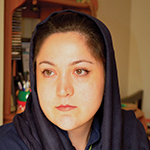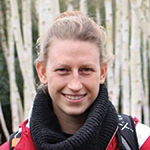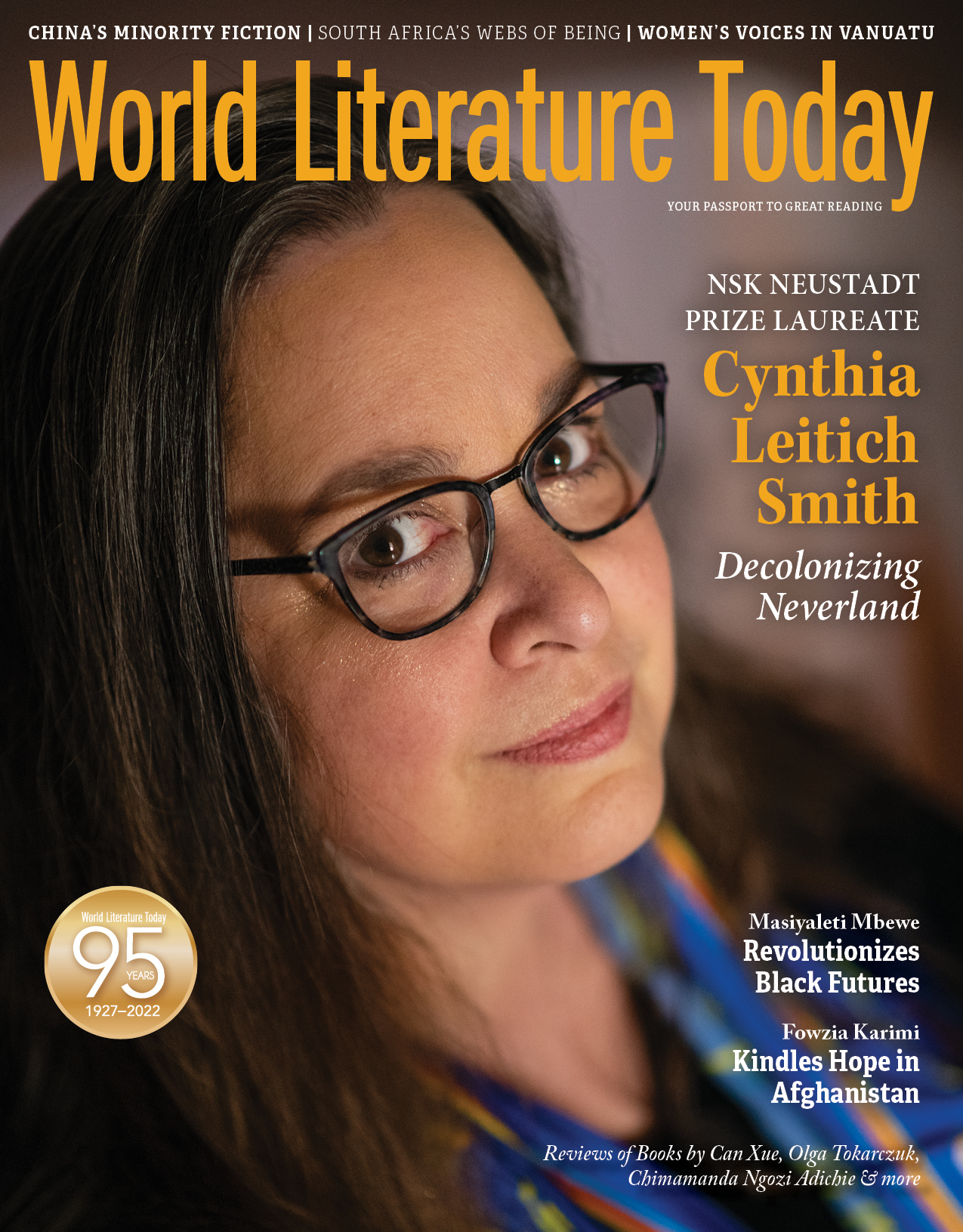Anahita
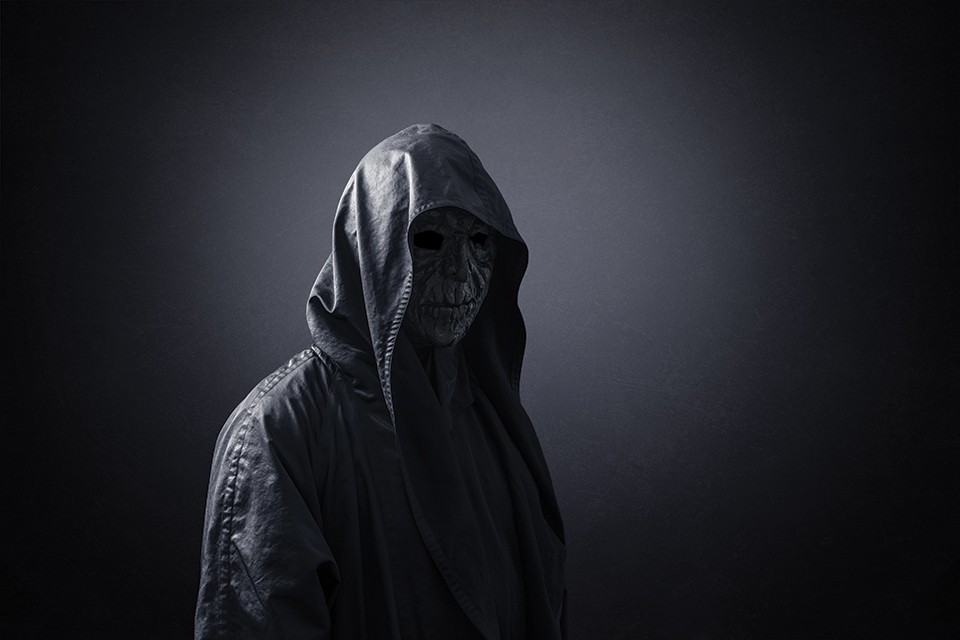
In a dimly lit crypt, a woman loses her way and finds her thoughts toggling between a mysterious man in the dark tunnel and a childhood friend.
The sun was setting when she got off the bus. She’d always wanted to see the fire temple, so she didn’t say a word to their group leader and headed out on the route that passed by there. They’d arrived in the city at noon and she was dying to go straight to the temple, but the other students in the architecture group didn’t seem too concerned. Everyone wanted to go to the hotel first, rest, and then go to the craft market. They were wasting her time. She’d read a lot about the temple and wanted to see it first thing. It was hidden deep inside a building that had survived the centuries, its ruins still standing. By car, it was an hour from the city to the ancient structure. She glanced at her left wrist. She’d forgotten her watch at home.
When she left the hotel, it was still light, but now the site was emptying out little by little as groups of visitors went home. Nobody from her group knew she was there. She hadn’t wanted anybody to know. What difference would it make anyway? Arranging her headscarf, she threw her backpack over her shoulder and made her way up the slight slope of the hill. She shrugged her shoulders, stretching her neck to the left and right. Her body was still a bit stiff. On the bus next to her, an enormous guy was sprawled out across the seat, apparently passed out in such a deep sleep there was no way to wake him up. The whole way there, she stared out the window at the vast fields of Azerbaijan Province. At that point they were practically to Kurdistan.
The long incline began with a gentle upward slope, but the higher she climbed, the steeper it got. By the time she crested the hill, reaching an expansive plateau, she was quite out of breath. It was getting dark by then, and the bright half-moon danced in the huge, rippling lake. She’d read somewhere that at some unknown time, a virgin girl would bathe in this water and get pregnant as a result.
Dina passed through a winding tunnel and emerged at the altar of the eternal flame.
The last groups of visitors were huddled around the water’s edge while their guide gave his final explanations before their departure. He spoke about the various epochs the site had lived through and how many times it had been sacked throughout history. Dina knew them all by heart: the Romans, the Arabs, the Mongols. Under the half-light of the moon, Dina was riveted by the vague outline of the structure. As she stared from her distant vantage point at the silhouette of the building, which was still intact behind fallen, splintered columns, she caught a glimpse of shadow sliding past, and then a flicker of light from a flame. Without making a sound, she slowly edged away from the group by the pool, skirted the lake, and stalked the shadow as she passed under medieval arches from the Ilkhanid period. The shadow kept pressing forward. Pursuing it, Dina passed through a winding tunnel and emerged at the altar of the eternal flame. It was out.
Dina knelt down and cast her gaze across the way from her elevated perch. A half-story below were the remnants of a place said to be an altar to the goddess Anahita, mentioned in the Avesta. Her eye fell upon a dark hole in a half-built stone wall, the joints of which seemed to be filled with something like mortar. A man dressed entirely in black, wearing a red hat and lantern in hand, hopped off the wall and slipped into the darkness. Dina didn’t get a good look at his face. The restoration of the site’s walls and the archaeological excavations had been on hiatus for quite a while. And the man didn’t look like an archaeologist or a day laborer anyway. Dina heard the sound of her own heart beating. The man’s silhouette reminded her of one of her nightmares. Even still, some kind of force induced her to follow him. Dina hopped down from the wall. She fished her flashlight out of her pack and followed the man into the hole.
The man’s silhouette reminded her of one of her nightmares.
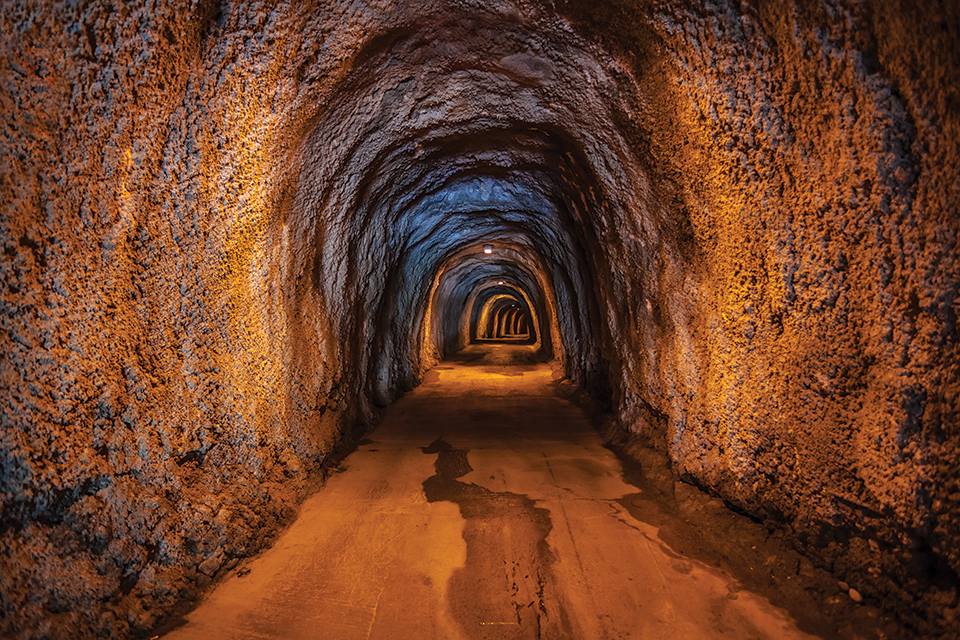
A long passageway with an arched ceiling and stone columns lay in front of her. In the distance she could just make out the light of the man’s lantern. She cast her flashlight on the walls. Here and there, traces of paintings and color caught her eye. A painting of a familiar face. But the walls were chalky, as though someone, or several people, had tried to conceal the paintings. From the method of construction and the materials used in the different parts of the passageway, she guessed that it must have been reconstructed or built over the course of several historical periods. She pushed forward, hunting for the man. It seemed a long way to her. The extended tunnel snaked downward and wound around. The farther she descended, the thicker and damper the air grew.
At its end, the passageway opened onto a chamber. She considered turning back a few times and didn’t know why she was still following this man. She was glad to have made it through the passage, though. She wasn’t likely to see paintings like that again anytime soon. Passing through the low-ceilinged, crescent-shaped entrance, she advanced into the chamber. The high, curved arch of the rectangular hall was studded with star-shaped designs. At the end of the hall was a kind of portico, elevated above floor level. The image of a man wearing a Phrygian cap and slitting a creature’s throat with a dagger graced the portico wall. Here, too, the portraits that encircled the painting seemed familiar to her.
Dina felt the man’s presence as he hid behind the hollow form of a man-shaped, lion-headed stone statue, which was staring at her. She could see the glint of his eye, could see how closely he followed her each and every step. It was as though his gaze slid over every part of her body, pierced it, and stealthily insinuated itself into her existence. Dina’s eyes surveyed the hall with its high walls, curved arch, and tall, stone pillars, as she tried to look unperturbed. Taking it two unsteady rungs at a time, she slid down the rickety ladder at the end of the hall and set foot in the crypt.
The dimly lit crypt, with its high-vaulted ceilings, was full of statues.
The dimly lit crypt, with its high-vaulted ceilings, was full of statues. Stone ones. At the bottom of each statue was an inscription scrawled in tiny letters, crammed together. It seemed they were the titles of the artworks. One statue was of a man hunched over, propping up an enormous boulder on his shoulder. His stare was familiar, something like Rahy’s. That innocuous look; a cool but kind stare. As she was observing Rahy, a cackle—maybe a man’s drunken laugh—reverberated through the crypt and unsettled her. It was as if the rest of the stone statues, men atop the column capitals, with their long, stone garments flowing down to the earth, were tracking her with their eyes. Dina pushed forward and jotted down everything she saw in her notebook. The man’s shadow flickered from one column to the next in pursuit, his face hidden behind a veil.
Dina advanced to the end of the crypt, where it dead-ended into a cave. She aimed her flashlight into the cave’s opening. Now lit up, the stalactites shadows’ yawned, overlapping onto one another. It was an arresting sight. Suddenly a mass of strange birds was squawking wildly, flapping toward her up out of the depths of darkness. She screamed, pressing herself against the wall. They were bigger than bats, with colorful feathers and eyes that gleamed. The man leapt out from behind a column, reaching his arms toward Dina. She let out a yelp, dropping her flashlight and notebook onto the ground.
“Don’t worry, they’re just Sina birds,” the man said, reaching for her arm. Dina, however, slipped into the cave and sprinted as far as she could. Her shoes were making it hard for her to run. She took them off, but her bare feet kept slipping, too. The ground was coated in some kind of slimy substance. She had to grip the walls with her hands, which kept making her nails break. Not even the slightest glimmer of light was visible in the mazelike corridor. Then her forehead struck something hard, and she fell to the ground unconscious.
When she opened her eyes, she couldn’t remember much, but she must have fallen in the water, since she was sopping wet from head to toe. The water likely whisked her shoes and pack away. The matches in her pocket were soaked and wouldn’t light.
“Did you have any idea where you were going?” the man said from somewhere behind her.
Dina turned toward the voice. She didn’t respond. Pain throbbed through her body. The distant sound of dripping water echoed through the air. A strange and indescribable feeling crept under her damp skin. But she didn’t remember anything.
In the oppressive dark of the cave, the man struck a match to light a lamp. His face was still covered, but his eyes were visible. Dina detected the kindness of an acquaintance in them. He knotted one end of a rope around her waist and the other end around his own.
“Don’t be afraid!” he said to Dina, who looked on in shock. “I just don’t want you to get lost. Now get up, let’s go.”
Dina pressed onward, and the man trailed behind her. The cramped, winding passage was slick, and after every turn came another, right on its heels. As far as the lamplight shone, she could see that the cave walls were covered with paintings: a string of pearls and oysters; a dagger and a crowlike bird; a morning glory and a cross. The way seemed endless to her.
“What were you doing in the Mithraeum?” he said.
“I came to see it,” she replied.
Dina hesitated for a moment and then asked, “What are you doing here?”
He didn’t reply.
“Why are my clothes all wet?” she asked.
“Don’t you remember? You smacked your head on a rock and fell into the stream. I came and pulled you out.”
“Where are my shoes?” she persisted.
“The water carried them away.”
When they turned the next corner, the air had grown colder. A chilling breeze penetrated her wet clothes, making her shiver. The floor grew steeper and the walls closed in. A gentle draft wafted by and blew out the lamp. Dina stopped, her hand reaching out and grasping the air as she searched for the man’s hand. Wind whistled through her empty fingers. She gripped the rope around her torso, the other end of which was cinched to the man’s waist. Sliding her palms along the walls, she pressed on.
“Where are you?” she called. “Take my hand!”
Her voice reverberated in the cave. She didn’t hear the man’s voice. She tugged the rope. It seemed its end was tied to nothing. She called out to him again and hunted around for a few paces in the dark. She clutched at the air, but there was no trace of him. Maybe he’d taken a different turn and lost her. Maybe . . . God forbid, he’d fallen into a pit or a ditch and she hadn’t realized? But she couldn’t hear a thing, and the rope was slack. She stood there in the dark, wet and trembling, unsure what to do. Trying to spur herself on, she said, “I can find the way on my own.”
Still, she didn’t move a muscle. She was anxious. After hesitating there for a while, she grew tired and decided to keep going in the dark on her own. Her bare feet kept sliding forward because of the steep slope. She tried to get a grip on the slimy surface with her toes so she wouldn’t fall. Suddenly, her long, loud scream rang out in the cave and ricocheted off the walls. Her foot had slipped and now she was sliding face-first down a very steep and long, snaking passage. Then, it was as if she’d fallen into a vacuum. Unable to sense the ground around her, it felt like she was dangling in midair. She swung back and forth like a pendulum. The faint sound of dripping water reached her from somewhere distant. She didn’t know why she thought of Rahy, her friend from childhood and her teenage years, while suspended like that. It had been ages since she’d heard from him. He was the one who hadn’t wanted to see her anymore, after it happened. The man had no doubt heard her screams and was coming to help her. She didn’t even know his name. She’d never told him she loved him. She’d heard it many times. That night, the last night, she told Rahy she was going to leave him, she was civil but indifferent as always, and Rahy, unusually, was cold but civil. Rahy had become someone else. A flock of birds flapped around her and then flew away. She didn’t have the strength to yell. She wanted the Rahy who was always kind, the one that she knew when she was a kid. She didn’t recognize the man Rahy had turned into that night. She yelled, calling for help.
A hand pulled on the rope, it seemed. It pulled her farther and farther up. A glimmer of light appeared above her. By the warm light of the lamp, the man’s familiar face slowly came into view. He was sweating and pulling the rope. Dina set her foot on the hard stone of the cave floor and stood up. Shoulder to shoulder with the man. She looked into his eyes. A strangely familiar memory was shining in the depth of the man’s gaze. Dina took the lamp from him and started walking. She said nothing all the way to the end of the path. When she stepped out of the cave alone, the sun was shining. A flock of Sina birds was circling in the sky. But there was no trace of her nightmares anymore. She opened her eyes. The wide, rippling lake lay before her.
Translation from the Persian
Read translator Michelle Quay’s note on translating “Anahita” from this same issue.
